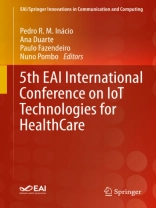This book presents papers from Healthy Io T 2018, the fifth edition of an international scientific event series dedicated to Internet of Things and Healthcare. The papers discuss leveraging a set of existing and emerging technologies, notions and services that can provide many solutions to delivery of electronic healthcare, patient care, and medical data management. Healthy Io T brings together technology experts, researchers, industry and international authorities contributing towards the design, development and deployment of healthcare solutions based on Io T technologies, standards, and procedures. Healthy Io T 2018 is part of the 4th annual Smart City 360˚Summit, promoting multidisciplinary scientific collaboration to solve complex societal, technological and economic problems of emerging Smart Cities. The event is endorsed by the European Alliance for Innovation, an international professional community-based organisation devoted to the advancement of innovation in the field of ICT.
- Features practical, tested applications in Io T for healthcare;
- Includes application domains such as e Health Systems, smart textiles, smart caring environments, telemedicine, wellness, and health management, etc;
- Applicable to researchers, academics, students, and professionals.
İçerik tablosu
Introduction.- Io T Sensors in the Framework of Aging in Place.- Pervasive Electrocardiography.- Study of Mechanomyographic Alternatives to EMG Sensors for a Low-Cost Open Source Bionic Hand.- Comparison of Different Polymeric Materials for Mobile Off-the-Person ECG.- Sleep detection using physiological signals from a wearable device.- An Exergame Integrated with Io T to Support Remote Rehabilitation.- Security challenges and suggested solutions For e-health information in modern society.- Internet-of-Things Based Respiratory Rate Monitoring for Early Detection of Cardiovascular and Pulmonary Diseases.- A Machine Learning Method for Screening Children with Patent Ductus Arteriosus using Intelligent Phonocardiography.- Identification of medical Io T devices APIs through ontology mapping techniques.- Context Awareness as resource for monitoring elderly depressed.- Telemonitoring Devices and Systems: Current Status and Future Trends.- Conclusion.
Yazar hakkında
Pedro Ricardo Morais Inácio has a Ph.D. degree in Computer Science and Engineering, obtained from the Universidade da Beira Interior (UBI), Portugal, in 2005 and 2009 respectively. The Ph.D. work was performed in the enterprise environment of Nokia Siemens Networks Portugal S.A., through a Ph.D. grant from the Portuguese Foundation for Science and Technology. He is a professor of Computer Science at UBI since 2010, where he lectures subjects related with information assurance and security, programming of mobile devices and computer based simulation, to graduate and undergraduate courses, namely to the B.Sc., M.Sc. and Ph.D. programmes in Computer Science and Engineering. He is currently the Head of the Department of Computer Science of UBI. He is an instructor of the UBI Cisco Academy.
Ana Paula Duarte is Full Professor at the Faculty of Health Sciences (FCS), University of Beira Interior, she is the Scientific Coordinator of Health Sciences Research Center (CICS-UBI) and Coordinator of Pharmaceutical Sciences Ph D Program from FCS. After her B.Sc. (Pharmaceutical Sciences, 6-year program), was trainee assistant from 1987 to 1991 and assistant from 1991 to 1996 at Faculty of Engineering, University of Beira Interior. After the Ph D (1996) she became Assistant Professor (1996-2000), Associated Professor (2000-2009) and is full professor since 2009. At 2009 she integrated FCS. From 2009 to 2013 she was vice-rector for Research and Innovation of University of Beira Interior. Since 2013, she is Scientific Advisor of “Centro de Biotecnologia de Plantas da Beira Interior”.
Paulo Fazendeiro received the Ph.D. in Computer Science and Engineering (2010) from the University of Beira Interior, Portugal. Currently he is an Assistant Professor at the Informatics Department of the University of Beira Interior. His research interests encompass Computational Intelligence and Granular Computing including the application of fuzzy set theory and fuzzy systems, knowledge discovery and evolutionary algorithms, multi-objective optimization and clustering techniques.
Nuno Pombo holds a Ph.D. in Computer Science and Engineering, and is assistant professor, researcher and senior consultant. His current research interests include: information systems (with special focus on clinical decision support systems), data fusion, artificial intelligence, and software. He is the coordinator of the Ambient Living Computing and Telecommunication Laboratory (ALLAB) at UBI. He is also member of BSAFE Lab, and Instituto de Telecomunicações – IT at UBI. He has around 60 scientific publications including book chapters, full-paper journals; e.g. IEEE Access, Artificial Intelligence in Medicine, Computer Methods and Programs in Biomedicine, Pervasive and Mobile Computing, Measurement, Sensors, and conference proceedings. He has strong experience in R&D and cooperation at European level projects with both academia and industry.












